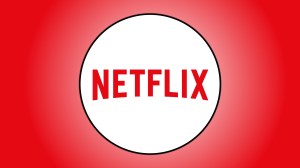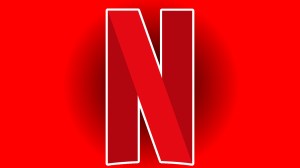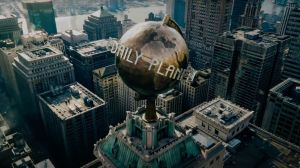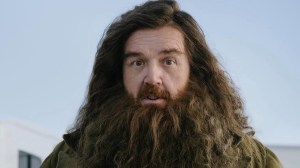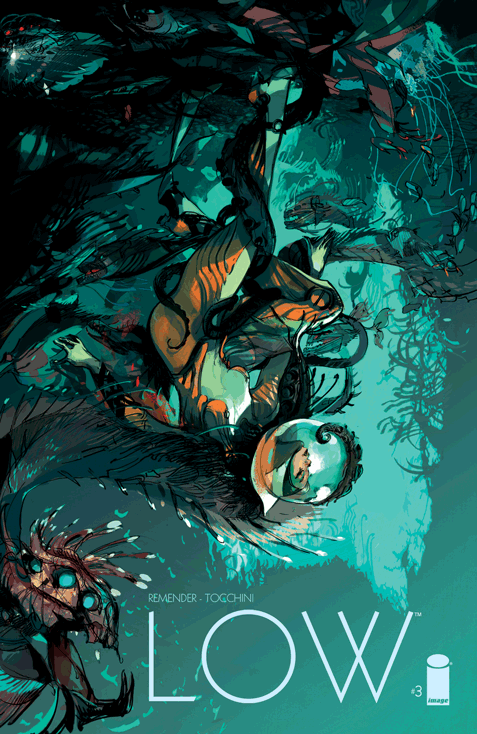
Rick Remender is easily one of the most popular and prolific writers in comics. Starting in the creator owned pool before moving to Marvel for successful runs on some of the company’s biggest properties. Recently -as I’m sure many of you are well aware- he dove back into creator-owned work at Image Comics with -count ’em- three new critical and commercial successes with Black Science, Deadly Class, and Low, with a fourth, Tokyo Ghost, dropping in 2015.
Videos by ComicBook.com
Oh, and then he’s also writing Marvel’s winter blockbuster event Avengers & X-Men: AXIS with a team of the biggest superhero artists in the biz, all while heralding the premier of Sam Wilson -The Falcon- as the new black Captain America. There’s also Avengers: Rage of Ultron, the new original graphic novel he’s making at Marvel with his long-time and insanely talented collaborator Jerome Opeña, just in time to be released with the sequel to one of the highest grossing films of all time.
Rick and I had a nice long chat about his creator-owned comics, how he went about building a big Marvel event, his writing process, the comics industry, and a whole lot more.
So I wanted to start off talking a bit about your Image work. You’ve got three books from them and each one is a hit. How does it feel, after working in creator owned comics for so long, to have these books out and doing so incredibly well?
Yeah, its obviously really exciting. I dedicated my life to creator owned comics from 1997 until about 2008 and the audience was not supporting them in those years. Its because of Walking Dead or 30 Days of Night, and maybe Hellboy, that were breaking 15,000 copies a month. Now we’re living in a world where numerous titles are selling well above that with a healthy audience and the readership doesn’t seem to be buying it only because its a trend. They seem to be buying it because its creator-owned material. It’s a very exciting time in comics.
Since you’ve been on this path for such a long time and you’ve seen the growth of the creator owned side of the industry, why do you think we’re here at this particular place, where now Image books can do so well and can reach such a broader audience than comics were before?
I don’t know, Voodoo? [laughs]
I’ve talked to some of my other creator friends trying to figure it out and one possibility is that the zeitgeist hit where you had a large number of of people interested in comic books or who were made interested in comic books by the Marvel films and The Walking Dead. Game of Thrones, The Walking Dead, which are based on fantasy novels and comic books have become zeitgeist-y. People are talking about them and they’ve reached a large audience of people outside of comics who become interested, and I think what we’re seeing is a lot of them come into comic stores, and maybe they’re drawn in by The Walking Dead which leads them to the retailer suggesting Saga, which leads them to picking up Black Science or Deadly Class.
Or maybe it’s through my Marvel work, where people go “oh, I loved Uncanny X-Force, or I loved his Avengers, so I’m going to pick this up.” I really just don’t know, and every time the numbers come in I go, “OK, get ready. It has to crash,” but instead they go up. Deadly Class, which is my quirky indie book -and in terms of doing unique and personal work I think Deadly Class is the most of that kind of thing that I’m currently doing- was the third best selling trade paperback last month. I’m very proud of the work and I think it has a lot to do with the amazing art team with Wes Craig and Lee Loughridge, who are geniuses in my opinion. But I felt the same way about Fear Agent, but that only sold 7,000 copies a month back in the day. Now people are discovering Fear Agent with the Library Editions and the rereleased trade paperbacks which are now selling like gangbusters.
So is it a seachange where people are coming from other places that are now interested in comics? I don’t know, but it keeps getting better. So maybe if we keep the books good and keep putting them out, maybe this isn’t the bubble that pops. Maybe people want interesting and creator owned comic books that are unexpected and done with passion.
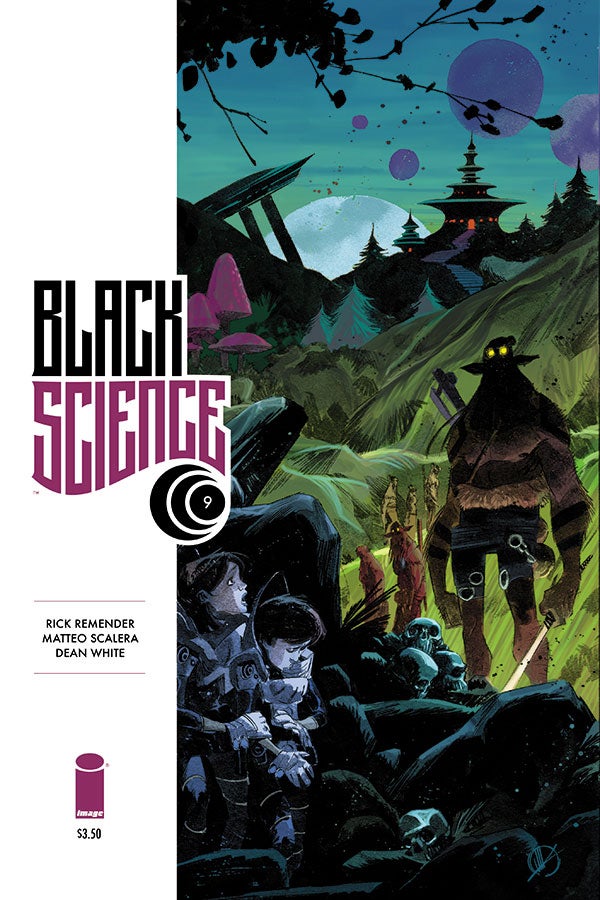
I think you are absolutely right. The key is the passion and the quality. Now with all of that said, you’re putting out six books a month, and I’m curious how you manage to pull that off without sacrificing quality, which you really don’t.
Well, the good news for me is that Low has been in the works for about three years, and I’ve got a huge outline and a ton of scripts finished. Between that and getting a good head start on Avengers & Xmen: Axis which I’m wrapping up right now, and having a good head of steam on Captain America, what’s happening is that a lot of books are coming out at the same time. This fall is the most books I’ve ever had come out at once, so from Image it’s Low, Deadly Class, and Black Science, and then from Marvel there is Axis, and Captain America. Those are the five that are coming out this fall, and of course Axis will be shipping two to three times a month. It’s quite a bit of material but its all stuff I’ve been working on for a really long time. We’ve been working on Axis for seven months now, and I’m finishing the final draft of Axis #9 now, after having revised it a number of times.
Now, even though you’ve been working ahead on all of these projects, I’m curious how you put yourself in the different headspaces for each book since they’re all very different from each other. Is it a matter of which one you feel like working on in the morning?
It’s really whatever fire needs to be put out or whatever artist needs to be fed. The way that I keep it straight is – like I said with Low, working on the outline for a number of years, and working my editor and with Greg Tocchini we put the first 20 to 25 issue detailed outline together a year and a half ago now. Same with Black Science. Before the first issue came out we had been working on it for a year. I’m of a mind that thinks its better to start way in advance and have a lot finished before you launch, and that enables me to keep the plates spinning.
If I have an outline done, like with Black Science I have the outline finished, and let’s say that I’m working on Captain America and Low, and I have to do an issue of Black Science, I go back and reread the last couple of issues to get my head into where the characters are and then I’ve got this really wonderful outline that tells me the beats and where I’m going so I’ve already got the plan, and now its just a matter of executing it.
A lot of the time what I’ll do, once I finish an arc – for example when Black Science #11 ships it’ll be the end of the second arc – I’ll find a week where I can sit down and spend the nights focused with my head in it and write the beats down. I’ll talk to Sebastian [Gerner, editor of Black Science] and Matteo [Scalera, artist of Black Science] and get the story down. It’s all about pre-planning and having a tight enough outline that you’re not winging it.
I think when you make it up and you wing it issue to issue, people can tell those kinds of comics. It has an unsatisfying feeling, and its almost like the egotism of the writer who’ll say “I’m just going to cook up some garbage this month and here it is!” I can tell when there is purity of intention and when there is a plan. You can tell when we’re clearly building to something that has been seeded and there is no seat of the pants on the story telling.
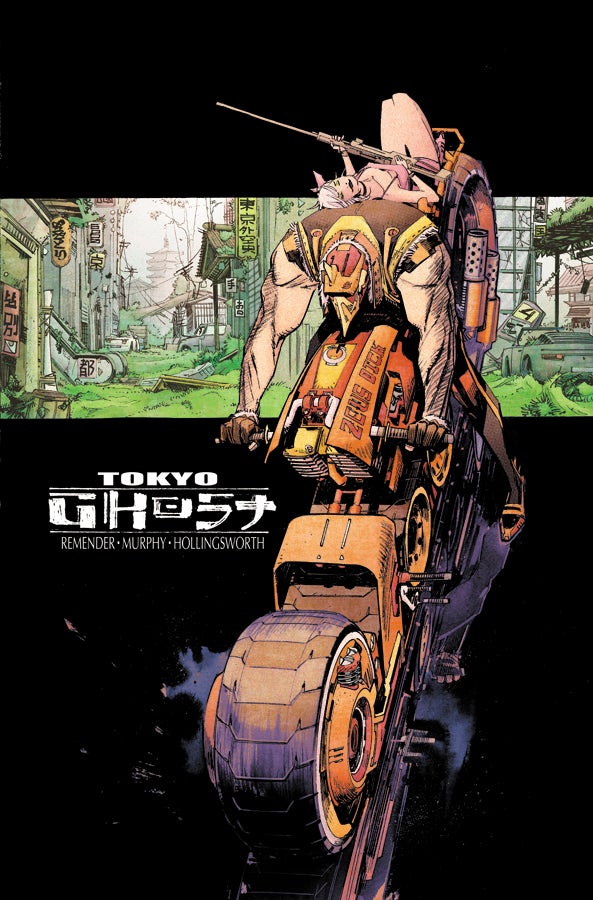
Yeah I agree, and it definitely shows in your work that you have a plan and that there is the care and intention there, and as a reader that’s something I really appreciate.What is your process for structuring each story and dealing with their themes in a way that they don’t overlap and blend into the same thing in different stories?
Well you just make sure you know the tone in your arcs, and those will change and fluctuate a bit. The first arc of Deadly Class was about how far a kid will go to fit in and to what lengths we all go as teenagers, to an exponentially higher degree in Deadly Class, to what lengths we’ll go to find acceptance and where we belong and our friends. .
Then with Low it’s about optimism in the face of crushing odds and seemingly insurmountable dangers, while Black Science is about the pros and cons of independence and the egotism that can be born of that and the self indulgence that can be born of that, versus the pragmatic realities of being a company man or a bureaucrat or any of those thing, and dealing with the consequences of seemingly wonderful technology. It’s all about how we look at the technology, and half the cast of Black Science thought opening doorways to other dimensions would allow us to discover and pilfer medicines and resources, but of course the negative side of that is diseases and all sorts of terrible things we might discover should we tamper with traveling to other dimensions.
Uncanny Avengers was, very clearly, me not allowing the X-Men and the Avengers to just become best pals. They had to earn their unity and we had to see the consequences of it when they were not unified, and that was really an examination of our country, in my mind, and the left and right continuing partisan divide and as they bicker of everything the world falls apart, which was the metaphor behind Uncanny Avengers.
So before I start, I always try to say, beyond the fun action and beyond the set pieces, beyond the crazy imagination, when people walk away from this story what is it I want to tell them. Even if its just as simple, I just want to make sure I have something to say with the story.
So with something like Low, where you’re intentionally writing hope, do you get a kind of feedback in your own life? When you’re writing about overcoming crushing obstacles, do you find yourself being more optimistic and positive in the face of what may be going on in your life?
It’s more about the process of me trying to be more optimistic, and more than optimistic, positive. I’m very negative in terms of my outlook. Life was pretty tough for a long time, and I had a lot of difficult things with family members and poverty and violence and all kinds of terrible shit, and so my brain is trained to examine the negative. For Low, its really the process of examining what I’m going through with that and how I do find the ability to focus on positivity and focus on the potential and what could happen, believing in it, working hard, and striving for it. That has always enabled me to succeed, even though it may have taken longer than I might have anticipated and it might have been a longer climb and a harder climb, if I can continue to keep a positive outlook on the end result and believe in it then a lot of the time it turns out that way. Low is really about the characters processing their situation and how they come to the same conclusions.
Stay tuned for the second half of our conversation tomorrow.


